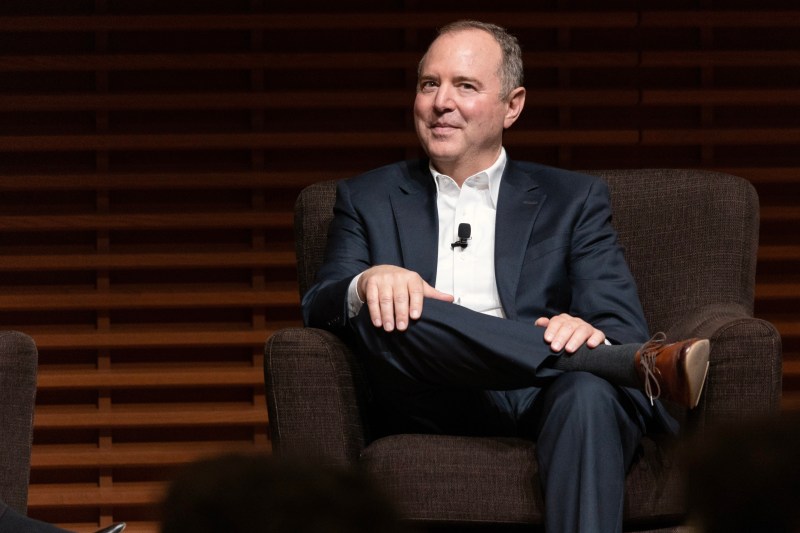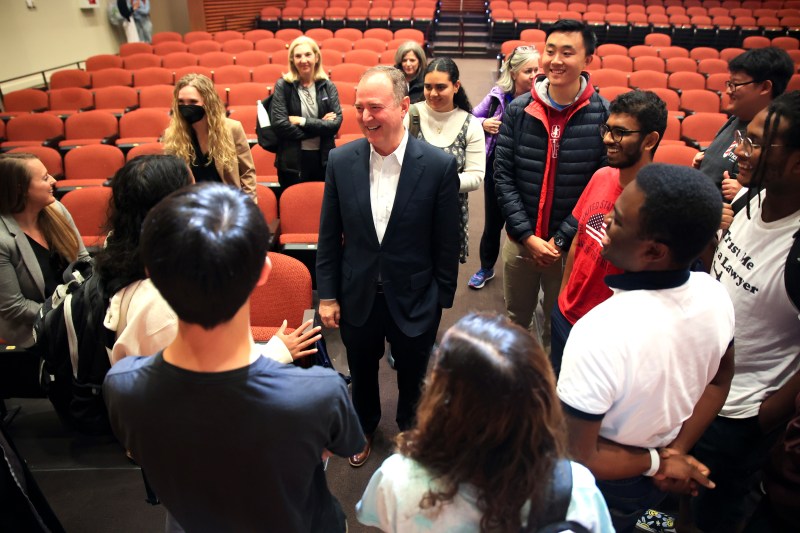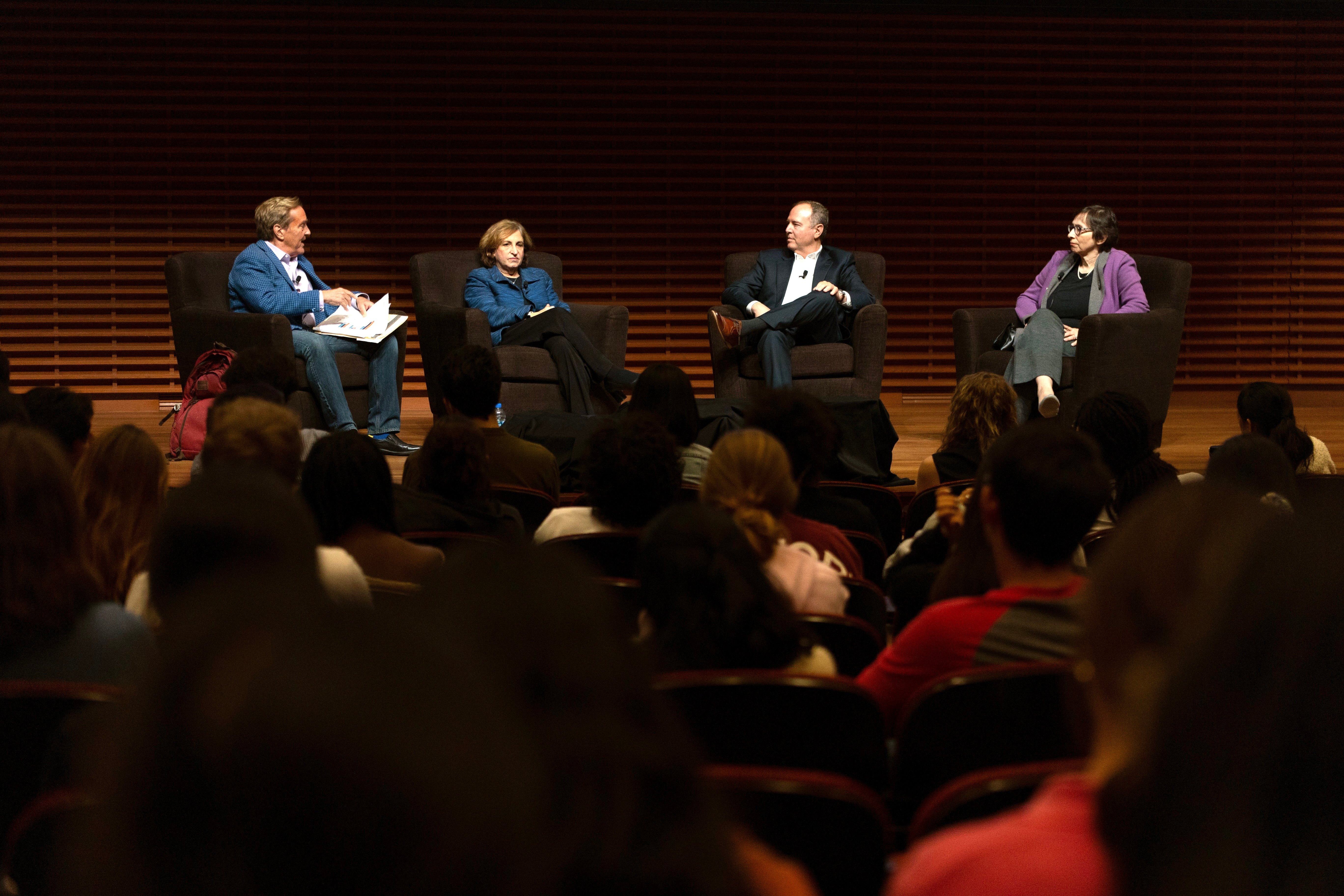Representative Adam Schiff (D-CA) ’82, the lead manager behind Donald Trump’s first impeachment, visited campus Monday evening to speak with “Politics 2022” students about the Supreme Court and warn of “the end of our democracy,” his prediction for the United States if SCOTUS exerts undue influence on state election processes.
He was joined by Stanford Law professor Pamela Karlan and Washington Post Deputy Editorial Editor Ruth Marcus in the class, which was moderated by Jim Steyer ’78 J.D. ’83.
Schiff cautioned that the Supreme Court could “legitimize the idea” that states can appoint their own electors or “empower them to change the rules of the election after it takes place” when it hears Moore v. Harper. He also predicted that “if the Republicans are in the majority [of Congress] in 2024 and their candidate loses, they would be willing to overturn the results of the election.”
After the event, Schiff told The Daily he is considering pursuing leadership if current speaker of the house Nancy Pelosi (D-CA) “were to retire” after the midterms.
He also said that if Democrats do not hold the house, “it’s going to be an absolute circus,” and followed up that “regardless of who’s in the majority,” Republicans like Marjorie Taylor Greene “will make [the country] absolutely ungovernable.”
Marcus shared concern for the midterm elections. She told The Daily after the event that if the house turned red, there would “absolutely be an attempt” to impeach Joe Biden. Her most pressing worry, expressed during the talk, was “if there were a decision like Bush v. Gore today,” the case which decided the 2000 election, “I’m not sure [the ruling] would be followed,” and declared this “a crisis of the Supreme Court’s making.”
Of the three on stage, Schiff was the most outspoken in his denunciation of the current Supreme Court. He expressed support for expanding or “de-stacking” the Court and introducing term limits for justices. “They are in crisis,” said Schiff. “This is no longer a conservative court, it is a court that is doing what it is doing because it can.”

Marcus, who has covered the courts since 1986 and recently wrote a book about Brett Kavanaugh, was slightly more hesitant, saying she was not fully decided on whether the Court was in irreparable crisis.
She criticized “de-stacking,” because “adding to the Court would be destroying the village in order to save it.” She said “Once Democrats go 13,” adding four justices to the Court to reverse the effects of Donald Trump’s appointments, “then Republicans go 15 and you’ve undone the institution.”
Karlan critiqued the Supreme Court broadly, addressing what she saw as substantial failures and holes in the logic employed by conservative justices, such as Justice Samuel Alito’s assertion that because abortion was not protected in 1868 it ought not to be in 2022. “History is complicated; the Supreme Court is going to say it’s simple,” she said.
Much of the class was spent discussing cases on the docket for the Court’s current session. Steyer predicted that after the Dobbs decision overturning Roe v. Wade and Planned Parenthood v. Casey, the cases which established constitutional protection for abortion, the Court would overturn Obergefell v. Hodges, the case which legalized same-sex marriage.
Marcus, Karlan and Schiff disagreed with Steyer and said it depended on the midterms. They noted that “the Supreme Court follows election returns” and the political judgment associated with their opinions.
Karlan said the Court would likely overturn Grutter v. Bollinger, the case which allowed schools to consider race as one of many factors in college admissions. She criticized the increasing politicization of cases and noted there was “no reason for the Supreme Court to take” the new affirmative action case unless they wanted to overturn Grutter.
Marcus believed politicians had failed to consider the consequences of their actions before pivotal court cases. “If you were fooled, senators,” she said of those who believed Roe would not be overturned, “you have no one to blame but yourselves.”
Students in the class were generally aligned in their opinions of the Court. Based on a poll sent before class, only 13% of the hundreds of students in CEMEX auditorium approved of the Supreme Court, compared to 40% of people nationwide.
93% of the class believed that the Supreme Court is “too conservative.” The audience reacted favorably to Schiff’s perspective, buzzing responsively when he wheeled out evocative descriptors, like “chokingly hypocritical,” a reference to the Court’s decisions.

Schiff returned several times to term limits and requiring an ethical code of the Supreme Court. He made the suggestion with a wink at Ginni Thomas, Justice Clarence Thomas’ wife. Thomas was the lone dissenting vote on a Jan. 6 Committee request for records, which included his wife’s texts.
Schiff sought out Karlan’s advice on the constitutionality of the maneuver, asking three times “What is the right answer?”
Karlan was pessimistic about term limits, as the Supreme Court would likely have to rule on them and would have a vested interest in not limiting justices’ terms.
However, Karlan said “there are ways to do [an ethics code] that would be constitutional,” based on section five of the 14th Amendment, or Congress’s enforcement clause.
Schiff concluded on a dour note. “My takeaway after two impeachments and an insurrection is this: you can have the best constitution in the world, and I think we do, or the best written laws … none of it is enough if you don’t give your oath of office meaning.”
As long as there were enough bad faith actors, he contended, no reform to the Court or to Congress would hold much weight.
